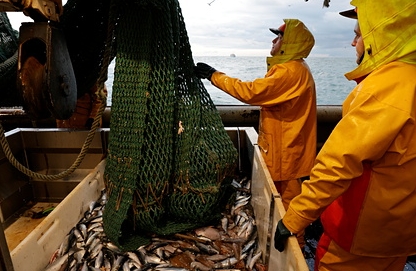
11 Aug
Fish delicacies prove to be a planetary threat
The consumption of fish and fish products is having a devastating effect on the planet due to carbon emissions. This is the conclusion reached by National Geographic researcher Enric Sala after analysing seafood harvesting by nets, which spoil the seabed on a huge scale, BBC writes.
There are thousands of genuine and aftermarket Detroit Diesel spare parts in our catalog. Use it for finding spare parts for the following engine elements in a matter of seconds by inputting part numbers.
The Spanish bio-oceanologist and National Geographic’s top researcher has sounded the conclusions that catching fish with heavy nets that drag on the seabed is detrimental to the climate. This most common fishing method in the world, called bottom trawling, destroys the landscape of the seabed, resulting in the emission of about as much carbon dioxide as the entire aviation industry.
Bottom trawling in the fishing industry generates about one gigatonne of carbon dioxide annually (two per cent of the world’s CO2 emissions). Aviation worldwide generates an average of 1.04 gigatons per year, or 2.5 per cent of total carbon dioxide emissions.
“The ocean is full of sea creatures. Plankton, microscopic algae and shrimp accumulate on the bottom for millions of years after they die. When at rest, these remains absorb carbon; when stirred up, they release it,” Dr Sala explained.
Fisheries experts have challenged Sala’s findings, accusing the oceanologist of overstating CO2 emissions from bottom trawling. The South African Deep-Sea Trawling Industry Association (SADSTIA) says the exact amount of carbon being released from the ocean into the atmosphere is currently unknown.
Sal’s counterargument is that the amount of emissions from trawling is not as important as the fact that seawater absorbs more carbon from the bottom and takes less carbon from the air.
The scientist argues that protecting the ocean will help stop these emissions. Many countries have already set up marine protected areas where trawling is banned. The Department for Environment, Food and Rural Affairs (DEFRA) sees a global target of protecting at least 30 per cent of the world’s oceans by 2030.
Barry Deas of the National Federation of Fisherman’s Organisations (NFFO) expressed fears that if too many protected areas are established, the fishery will simply change places, which will also affect catches and industry revenues.
The international research community is constantly looking for new ways to save the world’s oceans from human interference in their ecosystems. Recently, scientists at the Zoological Society of London proposed using artificial corals to restore populations of polyps, the planet’s most important indicators of pollution.
Copyright © 2021 PDSConsulting Contact us: info@pdsconsulting.co.uk.